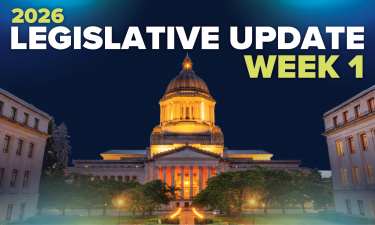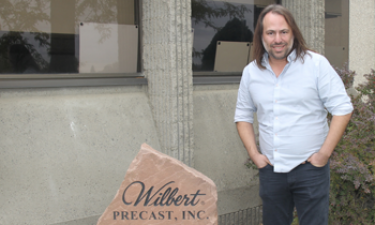By Jim Hedrick, GSI WA State Lobbyist and Spokane Regional Advocate
It is two weeks until the February 21 policy committee cutoff, the first procedural milestone of the 2025 session. Legislators continue to introduce bills, committee hearings dominated with public testimony taken on hundreds of bills and the process of marking up and taking votes on bills is starting. The pace of this session is slow . . . cautious. The pace is mostly due to lots of new committee chairs running a committee for the first time, the budget short-fall which has dampened any hope of passing policy with costs, and the unrelenting focus on the Trump Administration and how to counter-balance the onslaught of executive orders coming from the White House. The budget debate and how the state legislature is going to navigate significant budget cuts and the inevitable tax increases started to reveal itself this week.
Majority Democrats Release Two Executive Compensation Revenue Bills
This week, business advocacy group Enterprise Washington launched Seattle Times online banner ads and the budget and business groups including the Seattle Chamber, Association of Washington Business (AWB), Washington Roundtable, and the Bellevue Chamber released a new poll. The key theme found in the poll results is that voters in Washington State are more pessimistic than optimistic and there is concern about the economy and the availability of good-paying jobs. But despite this current pessimism, a majority of voters are optimistic about the future of Washington state, and most say they are proud to be Washingtonians.
Revenue bills are starting to be introduced in the House and Senate. HB 1785 (Doglio, D-Olympia) aims to address income inequality by imposing a tax where CEO pay in publicly traded companies vastly exceeds median worker pay. Under the bill, a 10 percent tax applies if the CEO-to-median worker pay ratio is 50:1 to 149:1. A 25 percent tax applies if the ratio is 150:1 or more. If a company fails to disclose its executive pay ratio, it automatically faces the 25 percent surcharge. Funds collected will go to the state general fund and the Department of Revenue will study expanding the tax to other companies not currently required to report executive pay ratios under federal law.
In the Senate, SB 5638 (Saldaña, D-Seattle), the Hospital Executive Excess Compensation Tax Act is aimed at increasing funding for healthcare access by imposing an excise tax on “excessive” compensation of hospital executives. The tax applies to the five highest-paid hospital employees (excluding those with direct patient responsibilities) and the lead administrator if not included. “Excess compensation” refers to salaries exceeding ten times the state’s average annual wage. Under the bill, hospitals must pay a 7.5 percent tax on the portion of executive salaries deemed excessive.
Ballot Initiative Reform
This week, the Senate State Government committee heard a bill that advocates believe will help prevent fraud and mistakes in our ballot initiative processes. SB 5382 (Valdez, D-46) will align Washington State practices with 22 other states in two ways: requiring the Secretary of State to validate voter registration addresses when they verify petition signatures, and increasing accountability by requiring that petition signature gatherers sign the attestation that has appeared on petitions for nearly 20 years. Opponents who testified, including Brian Heywood and Tim Eyman, say this oversight could end the initiative process as we know it in Washington State. Ballot initiatives are a big deal in Washington state, as progressive organizations spent over $41 million last year fighting the Let’s Go Washington initiatives.
Executive Order: Data Center Workgroup
On Tuesday, Governor Ferguson signed Executive Order 25-05 directing the Washington State Department of Revenue to establish and lead a data center workgroup aimed at evaluating the impacts of data centers on Washington’s economy, tax revenue, energy use, and the environment. The group will recommend policies and actions for addressing energy use and impacts on the economy and job market. Data centers are computing infrastructure that support Washington’s digital economy, but also consume significant amounts of electricity, which can put strain on the local power grid and can require increased energy generation, storage, and transmission.
Mergers & Acquisitions
The legislature is having another go at healthcare mergers and acquisitions this year, with a new version of the Keep Our Care Act, which failed to secure enough support in the House Democratic Caucus last year. HB 1881 (Taylor, D-Federal Way) focuses on preventing negative impacts on healthcare accessibility, costs, and quality, especially in underserved areas due to mergers and acquisitions. Key provisions include enhanced oversight from the Attorney General and a broadened scope of what constitutes a material change transaction to include mergers and acquisitions involving hospitals, provider organizations, insurers, and other healthcare entities. The bill also has stronger consumer protections that aim to prevent consolidations that could result in higher costs, reduced service availability, or lower care quality. Advocates for this bill and the previous iterations are keenly focused on access to reproductive, end-of-life, and gender-affirming care.
Bargaining Over AI Use in the Public Workplace
On Wednesday, February 5, the House Labor & Workplace Standards Committee heard HB 1622 (Parshley, D-Olympia) which strengthens labor protections by expanding bargaining rights for certain public-sector employees while addressing AI’s growing role in the workplace. Currently, public workers in Washington cannot bargain over the use of technology in the workplace, including AI. Under the bill, public employers must bargain over the decision to adopt or modify AI technology if it affects public employees’ wages, hours, or working conditions. Forty-seven Democrat representatives sponsored the bill, signaling they see the integration of AI into the workplace as a significant area of concern as a caucus. The Association of Washington Cities and the Association of Washington Counties are opposed, and the Public Ports Association had concerns, all suggesting the management right to make decisions about what is appropriate is impaired by the bill and that the bill will drive up bargaining costs for local governments.
Right to Repair
On Wednesday, February 5, the Senate Environment, Energy & Technology committee heard SB 5423 (Stanford, D-Shoreline). This bill aims to support the repair and service of digital electronic products (such as computers, phones, and appliances). Supporters say the goal is to increase consumer access to affordable repairs, particularly for residents in rural or low-income areas, while also fostering a competitive repair market to benefit small businesses. Under the bill, manufacturers must provide independent repair providers and owners with parts, tools, and documentation necessary for diagnosis, maintenance, or repair of digital products, ensuring fair and reasonable terms. Manufacturers cannot use software to inhibit the use of non-approved replacement parts after January 1, 2025. Repair providers must inform customers of steps to secure personal data during repairs, including backing up or resetting devices and managing passwords. Violations of the law will be subject to enforcement under the Washington Consumer Protection Act. Opponents of the bill point to the potential for data breaches if the bill becomes law. Right to repair has passed in five states and those in opposition to the Washington bill suggest a Colorado model that they say provides greater consumer security while also allowing for more repair options. Sen. Drew Hansen (D-Bremerton) has also introduced a bill that establishes the right to repair for mobility equipment specifically, SB 5680.
Road Usage Charge (RUC)
Next week expect to see the discussion on revenue for transportation heat up as House Transportation Chairman Rep. Jake Fey (D-Tacoma) is expected to introduce a bill establishing a Road Usage Charge or RUC. A RUC is a per-mile charge on private and commercial vehicles. The bill will provide a phased-in approach, but a full RUC is expected to be the primary way Washington will pay for state transportation infrastructure within the next eight years.
About the Author
Jim Hedrick is GSI’s State Lobbyist and Owner of H2 Government Relations. Jim has advocated on behalf of our community for more than 20 years and has 25 years of experience in the Washington State legislative and public policy venue as a fiscal analyst, legislative advocate, and political advisor to the Governor, state agency directors, and legislative officials.
About this Blog
This is week four of our Legislative Session. Read what happened during week one and week two.
*As part of GSI’s year-round work with our community to advance policies that support the success of local businesses, we’re active in Washington State’s current legislative session. We’re tracking bills, advocating on behalf of our community, planning our annual trip to Olympia, communicating our State Agenda, working with our lobbyist, our Regional Advocacy Committee, and our elected officials to advance priorities that support local businesses and enhance our community. Learn more about what we do to create a greater voice for the future of our region and view this year’s State Agenda.




